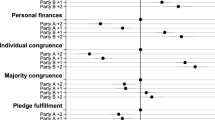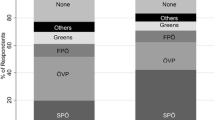Abstract
Issue importance mediates the impact of public policy issues on electoral decisions. Individuals who consider that an issue is important are more likely to rely on their attitudes toward that issue when evaluating candidates and deciding for whom to vote. The logic behind the link between issue importance and issue voting should translate to a link between issue importance and performance voting. Incumbent performance evaluations regarding an issue should have a stronger impact on the vote choice of individuals who find that issue important. The analysis demonstrates that there is a significant interaction between performance evaluations and issue importance. People concerned about an issue assign more weight to their evaluations of the government's performance on that issue when making up their mind.
Similar content being viewed by others
REFERENCES
Abramson, Paul, Aldrich, John, and Rohde, David (1999). Continuity and Change in the 1996 Election. Washington: CQ Press.
Berent, Matthew K., and Krosnick, Jon A. (1995). The relation between political attitude importance and knowledge structure. In Milton Lodge and Kathleen McGraw (eds.), Political Judgment: Structure and Process, pp. 91–109. Ann Arbor: University of Michigan Press.
Brody, Richard (1991). Assessing the President: The Media, Elite Opinion, and Public Support. Stanford: Stanford University Press.
Butler, David, and Stokes, Donald (1969). Political Change in Britain. London: Macmillan.
Downs, Anthony (1957). An Economic Theory of Democracy. New York: Harper & Row.
Duch, Raymond M. (2001). A developmental model of heterogeneous economic voting in new democracies. American Political Science Review 95: 895–910.
Edwards, George C., III (1990). Presidential Approval: A Sourcebook. Baltimore: Johns Hopkins University Press.
Fiorina, Morris P. (1981). Retrospective Voting in American National Elections. New Haven: Yale University Press.
Flanigan, William, and Zingale, Nancy (1994). Political Behavior of the American Electorate. Washington: CQ Press.
Fournier, Patrick (2000). Heterogeneity in Political Decision-Making: The Nature, Extent, Sources, Dynamics, and Consequences of Interpersonal Differences in Coefficient Strength. Unpublished doctoral dissertation. University of British Columbia, Vancouver.
Greene, William H. (1997). Econometric Analysis. Upper Saddle River: Prentice Hall.
Hinckley, Barbara, Hofstetter, Richard, and Kessel, John (1974). Information and the vote: a comparative election study. American Politics Quarterly 2: 131–158.
Iyengar, Shanto, and Kinder, Donald R. (1987). News that Matters. Chicago: University of Chicago Press.
Iyengar, Shanto, Peters, Mark, and Kinder, Donald R. (1982). Experimental demonstration of the not-so-minimal consequences of television news programs. American Political Science Review 76: 848–858.
Iyengar, Shanto, Kinder, Donald, Peters, Mark D., and Krosnick, Jon A. (1984). The evening news and presidential evaluations. Journal of Personality and Social Psychology 46: 778–787.
Johnston, Richard, Blais, Andre´, Gidengil, Elisabeth, and Nevitte, Neil (1996). The Challenge of Direct Democracy: The 1992 Canadian Referendum. Montreal: McGill-Queen's University Press.
King, Gary (1989). Unifying Political Methodology: The Likelihood Theory of Statistical Inference. Cambridge: Cambridge University Press.
Krosnick, Jon A. (1988). The role of attitude importance in social evaluation: a study of policy preferences, presidential candidate evaluation, and voting behavior. Journal of Personality and Social Psychology 55: 196–210.
Krosnick, Jon A. (1990). Government policy and citizen passion: a study of issue publics in contemporary america. Political Behavior 12: 59–92.
Lau, Richard R. (1985). Two explanations for negativity effects in political behavior. American Journal of Political Science 29: 119–138.
Markus, Gregory B., and Converse, Philip E. (1979). A dynamic simultaneous equation model of electoral choice. American Political Science Review 73: 1055–1070.
McCombs, Maxell, and Shaw, Donald (1972). The agenda-setting function of the mass media. Public Opinion Quarterly 36: 176–187.
Miller, Joanne M., and Krosnick, Jon A. (1996). News media impact on the ingredients of presidential evaluations: a program of research on the priming hypothesis. In Diana C. Mutz, Paul M. Sniderman, and Richard A. Brody (eds), Political Persuasion and Attitude Change, pp. 79–99. Ann Arbor: University of Michigan Press.
Miller, Joanne M., and Krosnick, Jon A. (2000). News media impact on the ingredients of presidential evaluations: politically knowledgeable citizens are guided by a trusted source. American Journal of Political Science 44: 301–315.
Mueller, John (1973). War, Presidents, and Public Opinion. New York: Wiley.
Neustadt, Richard (1960). Presidential Power. New York: Wiley.
Nevitte, Neil, Blais, Andre´, Gidengil, Elisabeth, and Nadeau, Richard (2000). Unsteady State: The 1997 Canadian Federal Election. Toronto: Oxford University Press.
Niemi, Richard G., and Bartels, Larry M. (1985). New measures of issue salience: an evaluation. Journal of Politics 47: 1212–1220.
Rabinowitz, George, Prothro, James W., and Jacoby, William (1982). Salience as a factor in the impact of issues on candidate evaluation. Journal of Politics 42: 41–63.
Repass, David R. (1971). Issue salience and party choice. American Political Science Review 65: 389–400.
Rivers, Douglas (1988). Heterogeneity in models of electoral choice. American Journal of Political Science 32: 737–757.
Rose, Richard, and McAllister, Ian (1990). The Loyalties of Voters: A Lifetime Learning Model. London: Sage.
Schuman, Howard, Ludwig, J., and Krosnick, Jon A. (1986). The perceived threat of nuclear war, salience, and open questions. Public Opinion Quarterly 50: 519–536.
Shapiro, Michael J. (1969). Rational political man: a synthesis of economic and socialpsychological perspective. American Political Science Review 63: 1106–1119.
Sniderman, Paul M., Brody, Richard A., and Tetlock, Philip E. (1991). Reasoning and Choice: Explorations in Political Psychology. Cambridge: Cambridge University Press.
Author information
Authors and Affiliations
Rights and permissions
About this article
Cite this article
Fournier, P., Blais, A., Nadeau, R. et al. Issue Importance and Performance Voting. Political Behavior 25, 51–67 (2003). https://doi.org/10.1023/A:1022952311518
Issue Date:
DOI: https://doi.org/10.1023/A:1022952311518




